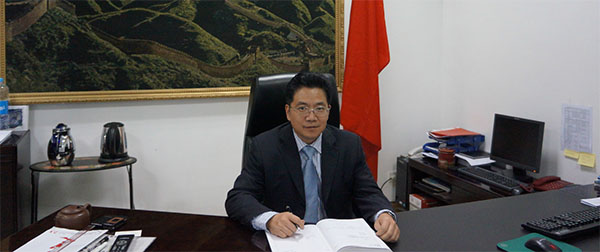(Exclusive for Daily Outlook Afghanistan)
Prime Minister Shinzo Abe of Japan blatantly paid homage to the Yasukuni Shrine where Class-A war criminals of World War II are honored at the end of the year 2013. This stirs up the memories of the Chinese and Asian people about the Japanese invasion history during WWII, and arouses the alert of the people in the world against the resurgence of the Japanese militarism. I made strong criticism in an article on the Daily Outlook Afghanistan not long ago. Hereby I would like to make further explanation and clarification on related issues to the peace-loving Afghan people.
First of all, what kind of place is the Yasukuni Shrine? It is not an ordinary cemetery, but an ugly and filthy place with evil spirits in it. The Yasukuni shrine was built in 1869, dedicated to the Japanese soldiers who died in the wars since the Meiji restoration, most of which were of the aggressive nature. By the time of WWII it had already become the spiritual pillar of the Japanese militarism. In 1978, the Shrine secretly enshrined Hideki Tojo and other Class-A war criminals of WWII, and put the killing tools and weapons of the Japanese military on display. All this was unearthed after a quite long period. Nearly 70 years after the end of WWII, still a handful of people blatantly try to justify the war criminals, beautify invasion history, stubbornly insist on and promote militarism conception of history. This is really ridiculous! Mr. Abe’s visit to the Shrine and paying "respect" to the aggressors and the executioners, is de facto advocating the "spirit" and "war history" of the Shrine, and trampling on the feelings of the victimized people. Claiming to "reflect on history" and "pray for peace" right before the souls of the war criminals is ironically the greatest blasphemy of peace!
Secondly, is Mr. Abe truly "pursuing everlasting peace"? Rather his track record provides evidence. Since taking office in 2012, he has been talking enthusiastically about justice, democracy, peace and dialogue. His actions suggest otherwise. He is unrepentant about Japan's militarist past and makes no apologies for it, and slips way far in the political right-wing deviation. He openly questions whether his country should be defined as an "aggressor", and does his utmost to beautify its history of militaristic aggression and colonial rule. Mr. Abe was photographed posing in a military jet boldly marked with the number 731, the code of a notorious Japanese biological warfare research facility performing human experiments in China during the war. Mr. Abe wishes to amend the post-war pacifist constitution, and demands to lift the ban on "collective self-defense" and to relax "three principles of arms exports". Recently, the Japanese Government labeled the Diaoyu Islands, which it illegally seized from China at the end of the 19th century, as “integral parts of Japanese territory” in the guidelines for junior and high school textbooks. The Liberal Democratic Party, the ruling party of Japan, has dropped the “no war pledge” from its annual working policy. Mr. Abe has worked hard to portray China as a threat, aiming to sow discord among Asia-Pacific nations, raising regional tensions and so creating a convenient excuse for the resurrection of Japanese militarism. Shouldn't we, as peace-loving people, be alert to Mr. Abe's intention and actions?
Thirdly, who is denying any dialogue or negotiation? It is the Japanese side! In recent years, the Chinese side has been consistently trying to deal with the impasse of Sino-Japan relationship and control differences through peaceful dialogue, and has been making unremitting efforts in enhancing bilateral relationship. The Japanese side, however, has never signaled any stance of sincerity. At the end of last year, when the Chinese side was ready to design the roadmap for improving China-Japan relationship in 2014, Mr. Abe blatantly paid homage to the Yasukuni Shrine, giving a full blow to the bilateral relationship and shutting the door of dialogue. The high level exchanges and meetings should be based on sincerity and goodwill with friendly atmosphere. The Japanese leaders and right-wing groups mistakenly betrayed the spirit of the Four Political Documents on China-Japan Relationship, undermined the foundation of bilateral relationship and challenged the postwar international order. How shall we initiate dialogue with such a group of people? It is better for the doer to undo what he has done. It is time for the Japanese side to wake up, correct mistakes, face squarely its own past and make efforts to remove the political barriers in the bilateral relationship.
It is the last thing that the Chinese side hopes to see that the China-Japan relationship is stuck in a deadlock. Nor does it fit the interests of peoples of the two countries. The Chinese side does hope to have friendly relations with the Japanese people. However, we can never tolerate the retroaction by the Japanese leaders on history issues and bilateral relationship. On February 27th, 2014, China's top legislature designates September 3rd as the Victory Day of the Chinese People's War of Resistance against Japanese Aggression, and December 13th a national memorial day to commemorate those killed by Japanese aggressors during the Nanjing Massacre in the 1930s. The occasions are expected to serve as a reminder of calamities the war caused to the Chinese people and the world, and as an expression of the Chinese people's stance of combating aggression and safeguarding human dignity and world peace. We hereby urge the Japanese leaders to honor their words with deeds, admit mistakes, stop provocation and appropriately handle outstanding historical issues in the spirit of being responsible to the history, to the people and to the future. Only by making a clean break with the past and stopping going back on its words, can Japan develop its relationship with China from the current impasse and have a future. Only by truly committing to a peaceful path and stopping saying one thing and doing something else, can Japan gain the trust of its neighbors and the world.

